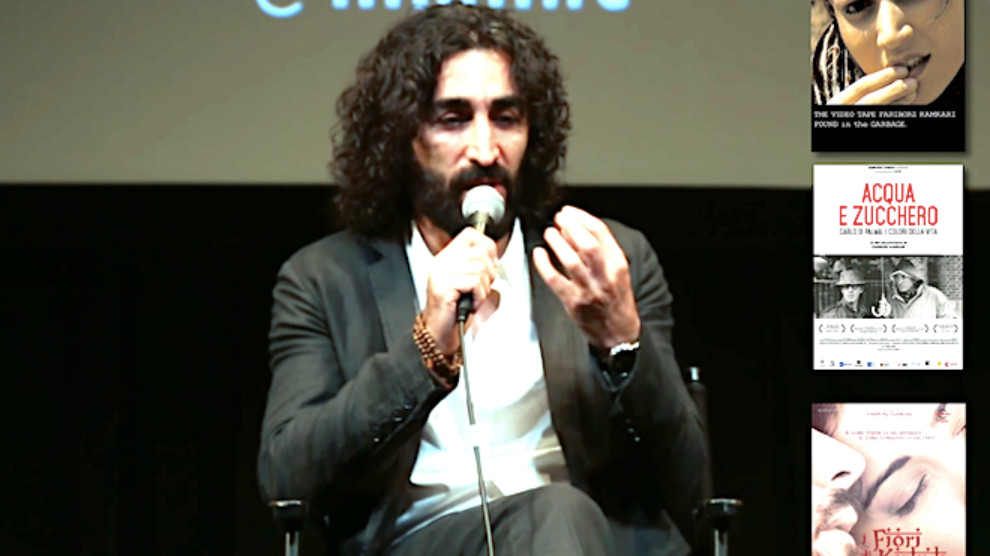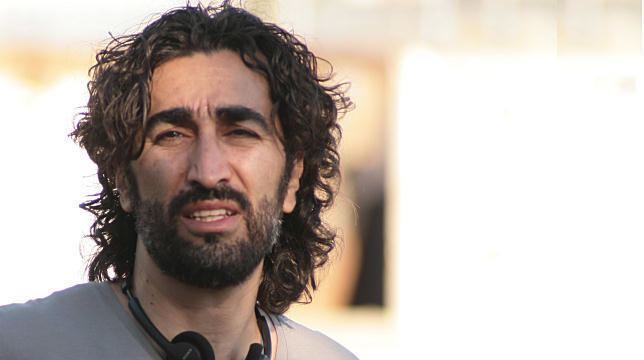Filmmaker Kamkarî: Kurdish artists cannot be apolitical
Ferîborz Kamkarî, who is from Sinê, East Kurdistan, talked about the future of cinema, Kurdish cinema and the coronavirus crisis.
Ferîborz Kamkarî, who is from Sinê, East Kurdistan, talked about the future of cinema, Kurdish cinema and the coronavirus crisis.

Despite being relatively young, Kurdish cinema has already produced important works and a number of directors have been emerging in recent years.
Ferîborz Kamkarî is one of these directors. He is a successful independent filmmaker and director living in Italy. His film, as he himself says, follows the Italian tradition of neorealism.
Expressing that the wars he witnessed in his childhood affected his cinema, Ferîborz Kamkarî said that "Kurdish artists cannot be apolitical". Emphasizing that Kurdish cinema should not be compared to world cinema, Kamkarî says his hopes for the future of Kurdish cinema is that "we could soon speak of a new Kurdish film school."
We talked to Ferîborz Kamkarî, who is from Sinê, East Kurdistan, about the future of cinema, Kurdish cinema and the coronavirus crisis.
You are producer and director... this seems to be an advantage, is it really an advantage?
For an independent filmmaker its quite important to be involved in the production of his/her own films. Usually as an independent filmmaker you have to struggle for the budget and often you find less money than what you need, so being the producer helps you to save money and decide how to spend it correctly.
You directed Water and Sugar, which deals with the legacy of Italian director Carlo di Palma; and the film opens kind of a door for the classic cinema’s history. What is the reasin you especially decided to make a film on Di Palma? What is his importance within the Italian cinema?
Carlo Di Palma represents a type of social and artistic cinema which I love. He comes from a cinema school which all the political/social filmmakers have learned a lot from (Italian neorealism). Making a documentary about Di Palma for me was a good opportunity to talk about the history of Italian neorealism and masters who I love. He worked with Visconti, Monicelli, Antonioni and many other great directors, knowing and studying their masterpieces can be very useful for young filmmakers and cinema lovers.
Black Tape was one of your very successful films. It was a documentary with a lot of fictional elements; how do you see your film?
It was my first feature film shot in Teheran. As a young filmmaker I had done many short films and it was important for me to make a first feature film in an experimental way. I was looking for a new language which could help me to pass government’s censorship and tell the story with a very little budget. Making a fictional documentary was the best way to reach these targets.
In the same film, you tell the story of Golî and her middle aged husband who is a businessmen. What exactly was your concern showing this story? And can you please tell us how the reaction of the Iranian state was on this film?
The story was about a very complicated relationship between a Kurdish woman and her husband. she tries to obtain her very basic rights (her real name is Galavej which is a Kurdish name). This leads her to a very deep conflict, not only with her husband but also with her family and her own past. At the end, when all the peaceful ways are closed she has no choice but use rifles to liberate herself. She dies but her younger sister continues her path in a more intelligent way.
The film unfortunately was never released in Iran.
You are at the same time a writer. One of the films which was a international success was The Flowers of Kirkuk (Gulakanî Kerkûk) and it was adopted from a book of yours. Can you please tell us the story of this book and the filming of it?
The book and the movie are based on a love story set in Iraq during Saddam Hussain’s regime. An Arab woman and a Kurdish man fell in love, but the destiny is against their love. The man is from Kirkuk and gets involved in the oil Enfal company which during this campaign the Saddam’s Army killed more than 200,000 kurdish people mostly from the city of Kirkuk . The Arab woman gets involved with her beloved’s sad destiny and becomes the witness of one of the most tragic moments in the kurdish history.
In your films we see social and political issues. Is there a special reason for that, how do you see the relation between art and politics?
First of all as a Kurd you can’t avoid politics. Unfortunately, our daily life has been upset by our political situation. As a kurdish artist you can’t be apolitical.
Cinema is a very strong communication instrument. It’s like a window to look at the world and at the same time it’s like a mirror to look at and have a better knowledge of yourself.
For the largest nation without a state, for people who have been divided in 4 parts and have suffered from censorship, cinema can be a helpful instrument to communicate with other nations, to have a dialogue with the rest of the world.
You were born in Sinê; which place has Sinê on your life, and how far are you now living from Sinê away?
I was not born in Sinê but it is my homeland because I was raised there. During my childhood there were 3 years of civil war between the central government and the kurdish liberation movement and then 8 years of war between Iraq and Iran. As a child of war, you can never free your soul. In all of my films and novels I have been very influenced by this period of my life .
You are living since long time in Italy. You can not return to your own country. How is this affecting your cinema?
I keep my contacts with my roots and go often in Kurdistan so I am not separate form my people. To be able to make movies in Europe its a great opportunity to become a kind of bridge between these 2 worlds. Talking about the middle east and its problems with a western audience and give an internal point of view about things that I have personally lived. This point of view often is different from what the mass media offer to their audience. Especially when it is about political, religious or economic interests. I think the world needs more of this kind of individual point of views from normal citizens who can narrate the events in a non official aspect.

Despite boundaries and censure Iranian cinema produces good works. In your own cinematography, what is the place of the Iranian cinema; is it similar, is it a source for your filmmaking, how much do you separate your work from it?
As I said before Iranian independent filmmakers have learnt a lot from Italian neorealism cinema. Maybe because during the revolution and the war in Iran have lived the very same situation of Italian filmmakers after the second world war. We need to communicate with the world outside and tell our stories but at the same time we suffer for the censorship and lack of money . These 2 elements forced Iranian directors to find a creative way to make simple but at the same time sophisticated films to pass censorship. Very often behind a simple story of an Iranian movie you can find many symbolic elements which lead you to a different interpretation.
Do you following Kurdish cinema? Are there any director you appreciate?
I follow Kurdish cinema in Bakur and Bashur and know many good new filmmakers. They follow the same way as mine. They use cinema not only to tell a story and entertain the audience (which is important) but also to communicate through cinema with the rest of world.
There are many good Kurdish movies each year in the festivals. I hope they find a way to live even out of festival circuits.
Within the global filmmaking, do you consider Kurdish cinema successful? What do you think which could be a better way to do cinema for Kurdish directors?
Kurdish cinema is still very young and comparing to the global cinema has to grow a lot. We Kurds have discovered cinema almost 100 years after its invention so we can’t compare ourselves with other nations who have their own government , their own ministry of culture and their own tv channels that support their filmmakers.
We still struggle to exist and our governments do everything to stop us.
Making a Kurdish movie is really difficult and the directors can’t concentrate only on the artistic issue of the film, but, after all, Kurdish movies are getting better each year and I am quite confident that we can say that there is a very young Kurdish school of film making.
Does Corona Crisis affect cinema and filmmaking? Will it cause any changes?
Of course it does. The cinemas will be closed for a long time and we don’t know when and how they will open. Actually the only way to see movies will be through tv channels or the networks. The channels are not very interested in independent cinema so it will be new a challenge for this kind of cinema and the situation will be even more difficult than before.
Are there any new projects you are working on? If yes, are they for Kurds or non-Kurds, can you give us some details?
I am finishing a documentary and also working on a new film. Both of them are about Kurdish issues.
Source: Yeni Özgür Politika